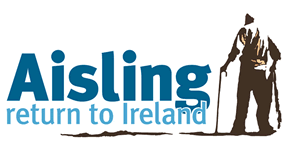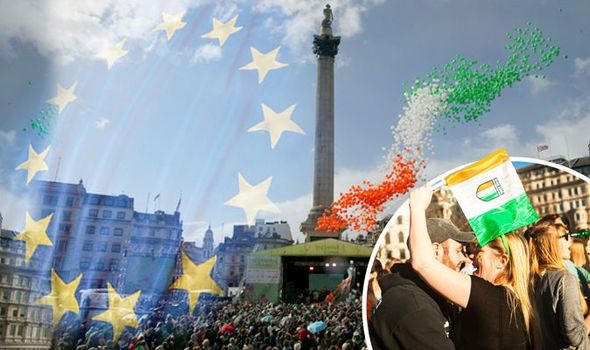Aisling has benefitted from open borders between Ireland and Britain for years travelling freely on the ferry with no stops or checks and crossing over the border without even knowing it but what future will Brexit bring?
Brexit is throwing some unexpected curve balls our way. How many of the voters on the leave side thought about the ructions that may ensue when borders are reintroduced or when friends and family members are no longer welcome in Britain? This is a real possibility yet I know of many Irish people here in London who voted leave and the Unionist Party in the North campaigned for a leave vote. There were many good arguments for leaving the EU particularly following the ignoble treatment of Greece and the looming TTIP trading agreement with the US but in terms of Irish interest there were many more reasons for staying. One evening in May before the referendum I got into a conversation with some Irish civil servants in a Dublin bar where I mistakenly started listing my objections to the EU and so enraged one of them that he overturned a table of drinks as he stormed from the pub saying that he would not sit here listening to me talking shit. I was only being devil’s advocate and had no intention of voting leave but I struck a deep nerve because the future for Ireland has been made very much more uncertain and it is probably more affected by Brexit than any other country in the EU, perhaps more so than Britain itself.
The whole of Ireland has benefitted from the relaxation of the physical border with the north and it seems ridiculous to most of us that anyone would want to go back to the old days of a hard manifestation of our divisions cutting across the country. The north as a whole voted over 60% to remain and Scotland voted the same by a greater margin and are now advocating for another independence vote in order to remain in the EU. What are the options for the north of Ireland? Well obviously there would be no border across the country and no part of Ireland would have to leave the EU in a united country. However the Unionist advocacy of a leave vote proves nothing has changed in the Unionists position in that regard and probably never will but they may be losing the demographic advantage. Indeed the establishment in the south would probably look on a united Ireland as a poisoned chalice. We really have tied ourselves in knots down the years with Ireland’s relationship with Britain and Brexit has thrown this into relief like never before.
There is a whole lot of difference between being separate countries within the EU and being separate and adrift from each other post Brexit. Will the common travel area manage to survive Brexit as the British and the Irish government claim to want? Maybe it is no longer up to either and it is now on the table with everything else for negotiation and such private arrangements may be ok within the EU but can the EU tolerate a soft border in Ireland and a hard border between Ireland and Britain or between the south and the north or between an EU country and a non-member of the Union? It is very hard to see how all this can turn out well as the British government goes hell for leather to cut its ties with the continent despite most of the government being firmly in favour of remaining in the union before the vote and the Celtic regions voting in favour, not to mention the fact that if the referendum was called today, knowing what we know now, a majority in Britain might well want to remain.
So what is it all about? The euro-sceptic wing of the Tory party has long been a thorn in the side of the more pragmatic Conservatives who saw their interests doing very well in Europe as it always was a partnership designed to be pro-business and very much in favour of big farmers and landowners. The politicians have done well for themselves too on the Brussels gravy-train and despite the occasional bossy, bad-tempered speech in Strasbourg from Cameron or Thatcher they had no real intention of pulling out and went along with minor irritants like workers’ rights (minimal) and minimum wage agreements (very minimum) as long as the benefits in trade and services were coming the way of themselves and their friends and backers. Cameron must have felt himself to be on safe ground when he called a date for the referendum last summer after comfortably winning the general election leaving UKIP with only one ex-Tory MP. A resounding pro Europe vote would silence once and for all his grumbling backbenchers and UKIP would be kicked into history.
How wrong can you be? They were so complacent that none of the pro-EU Tories campaigned enthusiastically to remain in Europe but the sceptics and the right-wing press campaigned vociferously against Europe, given massive amounts of space in the papers to misleading stories and outright lies about the huge dividend to the nation Brexit would bring (remember the £35m pw. for the NHS? Well forget it). Jeremy Corbyn couldn’t get a word in on the print and broadcast media so took to the streets and spoke at more than 100 meetings and rallies across the country but with half his own party endlessly criticising him also given plenty of space in the in the mass media he was on a hiding to nothing. In the event two thirds of Labour voters voted remain but from the coverage in the press and the BBC you would think they had voted 100% to leave.
It seems anything goes when criticising Corbyn and McDonnell. On BBC’s Question Time the other day the leader of the Scottish Conservatives accused the Labour leadership of supporting the IRA back in the 80’s. John McDonnell was deputy to Ken Livingstone as leader of the GLC and with London facing bombings and the Irish community facing the backlash both politicians felt it was in their remit to speak to the republican leaders in Ireland in order to help bring about a peace process. They did so but they were not the first only the first to do so in public. The British government had held secret talks with Gerry Adams and Martin McGuinness and other republicans ever since the Troubles started. The fact that we have had peace and a power-sharing executive in the north for almost 20 years is in no small way thanks to McDonnell and Livingstone and other brave people. Anyone who watched TV coverage of Martin McGuinness’ funeral last week cannot have failed to notice Bill Clinton and Tony Blair honouring McGuinness as a brave man who helped to bring about peace. They should also recognise and applaud Corbyn and McDonnell’s contribution.
With Paisley and McGuinness, the two titans of north of Ireland politics gone, keeping the peace process going was always going to be difficult, with the many uncertainties of Brexit it will be even harder still. Added to that the self-destructive path of the current British government and the resurgence of the xenophobic right we are in uncharted territory. The north of Ireland has known little if any charted waters over these last few decades but we can thank those British politicians who were brave enough to face down ignorance and talk through their differences with Irish republicans who also had to face dissent from their own ranks to bring about (let’s hope) a lasting peace. We need leadership south of the border now to be firm and to forge a deal with Britain and the EU to keep an open and positive relationship so that we can live side by side in a whole Ireland with no borders and good relations with our neighbours. Otherwise I’ll get the blame and won’t be able to go for a drink in Dublin again.
Alex McDonnell
Coordinator
The Aisling Project

